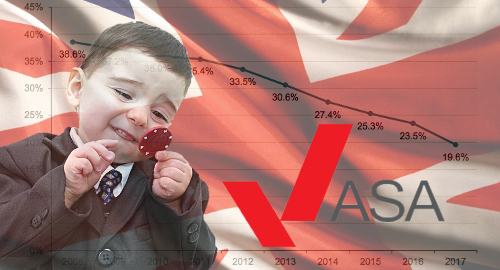 UK children are being exposed to fewer gambling advertisements than they were five years ago, according to a new watchdog report.
UK children are being exposed to fewer gambling advertisements than they were five years ago, according to a new watchdog report.
On Friday, the UK’s Advertising Standards Authority (ASA) issued its latest report on ‘Children’s exposure to age-restricted TV ads,’ which covers how much gambling, alcohol and junk food commercials were reaching children during the period spanning 2008 to 2017.
The report shows kids’ exposure to gambling adverts on a steady rise from 2.2 ads per week in 2008 – the year gambling advertising rules were relaxed – to 4.4 ads per week in 2013. That was the last year before the UK revamped its gambling licensing regime, restricting advertising opportunities to operators licensed by the UK Gambling Commission.
By 2017, the number of gambling ads viewed by kids had declined to 2.8 per week, which, while still marginally higher than the 2008 figure, nonetheless represents a 37.3% decline from its 2013 peak.
In fact, all of the ‘age-restricted’ advertising categories tracked in the report showed declines since 2013, and the ASA cautioned that a good chunk of this fall may be due to children changing their behavior, i.e. watching less broadcast TV in favor of on-demand and online content and thus seeing less ads of any type.
Conversely, the report shows adults’ overall exposure to ‘adult’ advertising relatively constant. Gambling adverts viewed by adults briefly dipped after peaking at 14.5 ads per week in 2013, but the 2017 figure was back up to 14.2 ads per week.
The ASA didn’t start breaking down gambling ads by category until 2011, but the majority of ads viewed by kids since that date have largely been of the state-sponsored variety.
Bingo led the product chart with 1.9 ads per week in 2013, dropping to 0.8 in 2017. Lottery and scratchcard ads peaked at 1.3 per week in 2012 and fell to 0.9 in 2017. The number of sports betting ads viewed by kids in 2017 was just 0.4 per week, down from one per week in 2011. Even casino ads scored higher impressions (0.7 per week) than sports betting in 2017.
The UK media has been howling about gambling advertising for years now, and their histrionics paid off last December, when UK betting operators agreed to a voluntary halt to advertising during live sports broadcasts and other sports programs in the pre-watershed (9pm) period.
However, since 80% of UK gambling marketing now takes place online and children’s eyeballs have been migrating away from terrestrial TV to online options, expect the usual media suspects to begin lobbying for new restrictions that will limit marketing to men standing in dark alleyways issuing hushed betting come-ons to passers-by.